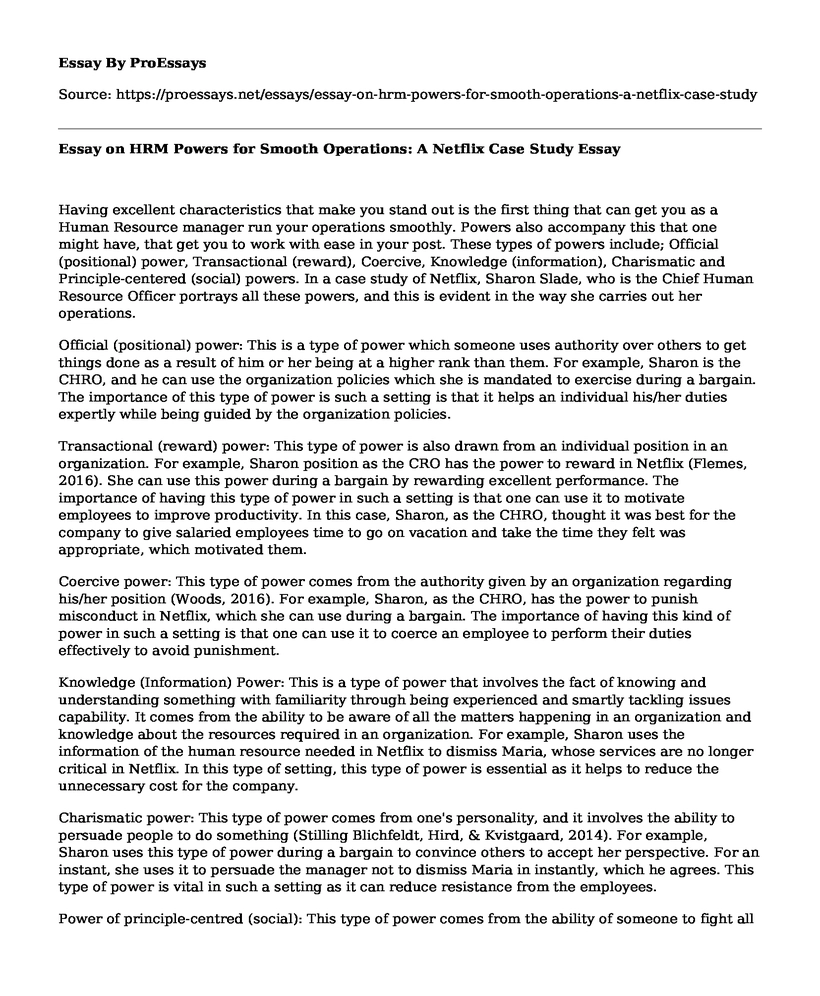Having excellent characteristics that make you stand out is the first thing that can get you as a Human Resource manager run your operations smoothly. Powers also accompany this that one might have, that get you to work with ease in your post. These types of powers include; Official (positional) power, Transactional (reward), Coercive, Knowledge (information), Charismatic and Principle-centered (social) powers. In a case study of Netflix, Sharon Slade, who is the Chief Human Resource Officer portrays all these powers, and this is evident in the way she carries out her operations.
Official (positional) power: This is a type of power which someone uses authority over others to get things done as a result of him or her being at a higher rank than them. For example, Sharon is the CHRO, and he can use the organization policies which she is mandated to exercise during a bargain. The importance of this type of power is such a setting is that it helps an individual his/her duties expertly while being guided by the organization policies.
Transactional (reward) power: This type of power is also drawn from an individual position in an organization. For example, Sharon position as the CRO has the power to reward in Netflix (Flemes, 2016). She can use this power during a bargain by rewarding excellent performance. The importance of having this type of power in such a setting is that one can use it to motivate employees to improve productivity. In this case, Sharon, as the CHRO, thought it was best for the company to give salaried employees time to go on vacation and take the time they felt was appropriate, which motivated them.
Coercive power: This type of power comes from the authority given by an organization regarding his/her position (Woods, 2016). For example, Sharon, as the CHRO, has the power to punish misconduct in Netflix, which she can use during a bargain. The importance of having this kind of power in such a setting is that one can use it to coerce an employee to perform their duties effectively to avoid punishment.
Knowledge (Information) Power: This is a type of power that involves the fact of knowing and understanding something with familiarity through being experienced and smartly tackling issues capability. It comes from the ability to be aware of all the matters happening in an organization and knowledge about the resources required in an organization. For example, Sharon uses the information of the human resource needed in Netflix to dismiss Maria, whose services are no longer critical in Netflix. In this type of setting, this type of power is essential as it helps to reduce the unnecessary cost for the company.
Charismatic power: This type of power comes from one's personality, and it involves the ability to persuade people to do something (Stilling Blichfeldt, Hird, & Kvistgaard, 2014). For example, Sharon uses this type of power during a bargain to convince others to accept her perspective. For an instant, she uses it to persuade the manager not to dismiss Maria in instantly, which he agrees. This type of power is vital in such a setting as it can reduce resistance from the employees.
Power of principle-centred (social): This type of power comes from the ability of someone to fight all odds of influence from peers and the surroundings and be able to have a firm stand. This type of power comes from being self-driven and having high standards of self-discipline. This helps someone to make reliable decisions (Woods, 2016). For example, Sharon can explain to his CEO that it is not right to delay a meeting and keep co-workers waiting because of a pool game. This shows how Sharon can stand firm by her principles. Having this kind of power in such a setting is vital as one can make better decisions on what is of importance to tackle instead making bad decisions in serving her employees.
Conclusion
In conclusion, having these types of powers altogether is very crucial as a Leader. Therefore, Sharon being the CHRO of Netflix and having shown to have these types of capabilities, proves how she is an excellent leader. These powers combined show that they can make one stand out among others.
References
Flemes, D. (Ed.). (2016). Regional leadership in the global system: ideas, interests and strategies of regional powers. Routledge.
Stilling Blichfeldt, B., Hird, J., & Kvistgaard, P. (2014). Destination leadership and the issue of power. Tourism Review, 69(1), 74-86.
Woods, P. A. (2016). Authority, power and distributed leadership. Management in Education, 30(4), 155-160.
Cite this page
Essay on HRM Powers for Smooth Operations: A Netflix Case Study. (2023, Feb 11). Retrieved from https://proessays.net/essays/essay-on-hrm-powers-for-smooth-operations-a-netflix-case-study
If you are the original author of this essay and no longer wish to have it published on the ProEssays website, please click below to request its removal:
- Essay Sample on Promoting Safety
- Maximizing Human Capital for Optimal Performance in Organizations - Essay Sample
- Immigrants: Low Pay & Labour Rights Explored - Essay Sample
- Office Environment: Key to Employee Happiness and Productivity - Report Example
- Gaining a Competitive Advantage: How Businesses Make Money Selling Goods and Services - Essay Sample
- Essay Example on Career Choices in Security and Loss Prevention: Options and Outcomes
- Motivation and Its Benefits/Drawbacks in Children: A Unit One Overview - Essay Sample







